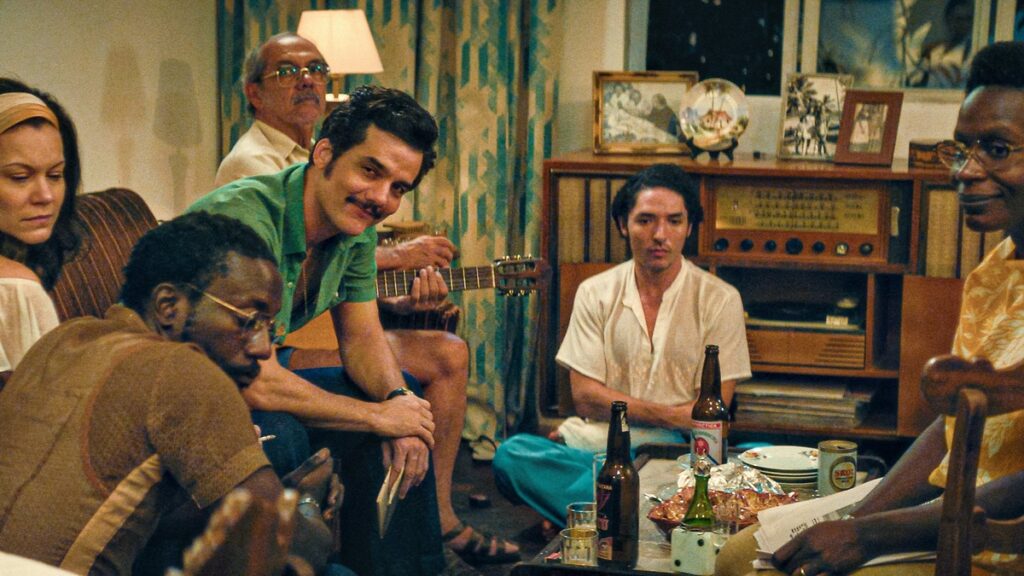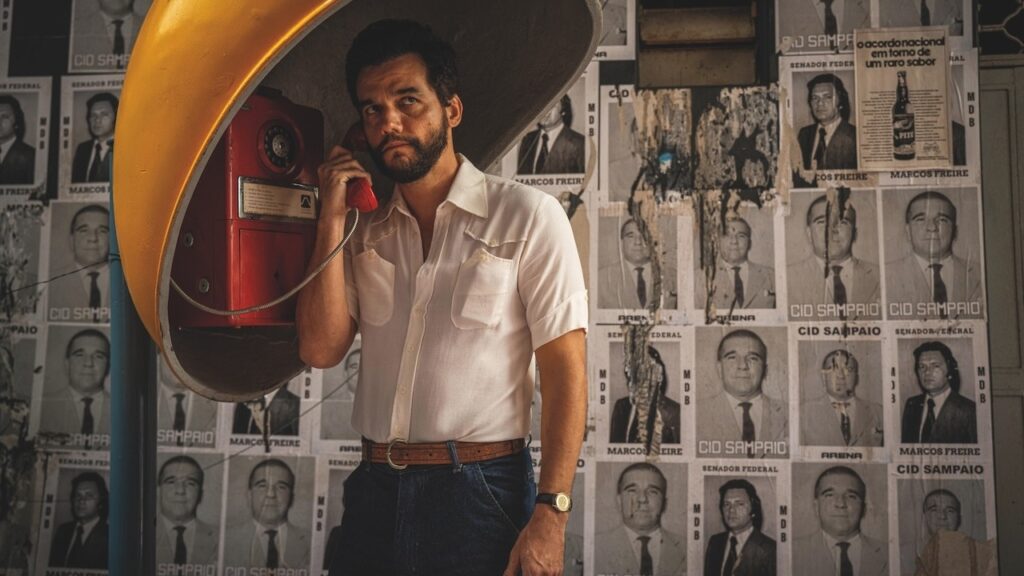Brazilian auteur Kleber Mendonça Filho lovingly recreates 1977 Brazil to explore the country’s military dictatorship and proves that small joys can be discovered in even the worst times.
Set in Recife, the film follows political refugee Armando (Wagner Moura) as he assumes a new life as Marcelo. The film throws audiences straight into proceedings, never explaining exactly how he came to be in this situation. But, whatever has happened in his past, Armando has been forced to leave his old life behind.
Mendonça Filho leisurely lets audiences introduce themselves to the town and the people. The first hour explores Armando’s new life and the apartment block filled with political refugees and those escaping their own past. The writing is beautifully restrained, refusing to sit and overexplain the plot.
A Unravelling Tale Of Life In 70s Brazil
The title may be slightly misleading, as The Secret Agent is not the spy thriller suggested. Mendonça Filho masterfully blends different genres to complete a layered and realistic portrayal of the town and the mood of the country in this era.
This film feels like an extension of the ideas Kleber Mendonça Filho presented in 2023’s documentary Pictures of Ghosts. The period piece compares filmgoing to churchgoing, emphasizing how small things like cinema can unite communities in times of need.

It’s 1977. We meet Armando (Wagner Moura), who is now going by the name Marcelo, as he arrives at a residential complex in Recife during the annual Carnival period. The film’s highlight is the owner of the building, Dona Sebastiana (Tânia Maria), who is the type of elderly lady who knows everything about everyone, and even if she doesn’t know, she will claim she does. She immediately tries to set Armando up with the glamorous upstairs neighbor, Claudia (Hermila Guedes). Everyone here is a political refugee who tries to get by day to day life under the threat of death.
The film flits through the lives of different people living in the area, from corrupt local police officers to the registry office and bounty killers sent to take down Armando. The bouncing between different subplots forces audiences to pay attention and wait for the plotlines to intersect. Despite the many threads at work here, not a single moment feels wasted, and every single character and plot gets the payoff it deserves.
While the first act plays like a family drama amid a heavy political climate, the last two-thirds of the film turn into the more expected gangster thriller. Dead bodies are dumped from bridges, gunmen run through city centres, and hitmen are hired. Just as the opening act staggers from the long runtime, the film gets an energy boost with the introduction of a more adrenaline-fuelled subplot.
At 158 minutes runtime, The Secret Agent feels half the length. Mendonça Filho has somehow managed to create a film that is almost three hours long and barely feels two. Much like One Battle After Another, it’s impossible to feel bored during The Secret Agent because there are three or four films in one here. It’s part drama about political refugees, part Brazilian thriller, and part action film. Whatever your tastes, you’ll find what you like here. Yet, despite all the genres, it never feels tonally jarring as every plot is perfectly balanced thanks to the tight writing.

The Secret Agent Focuses On Humanity During Military Regime
Mendonça Filho turns a harrowing and heavy subject into a crowd-pleasing and very human film. The Secret Agent will inevitably be compared to Walter Salles’ I’m Still Here, which also discussed Brazil’s harsh military tactics in the 1970s. This film is much less of a thriller than this year’s Oscar-winner, concentrating on just one seemingly ordinary man and his role in the grand scheme of things.
Wagner Moura is extraordinary in the role, essentially playing multiple versions of the same character over the years. There’s a good reason why Moura took Best Actor at Cannes. It’s a layered portrayal of an ordinary man trying to do the right thing in a really difficult era of Brazilian history. He subtly portrays a man internalizing the pain of his past while continuing his journey as a hero in the face of corruption.
The Secret Agent is also a beautiful representation of how life goes on, even when a community is under a harsh political regime. Armando’s father-in-law works as a projectionist at a cinema and his young son Fernando (Enzo Nunes), is obsessed with watching Jaws on the big screen. Even with dead bodies strewn out on the road, people still want to escape and catch a horror movie. Mendonça Filho was 8 years old in 1977, and this thread about the power of cinema perhaps represents the director inserting a little bit of his younger self into the film.
Mendonça Filho’s film lovingly recreates the world he grew up in. The political landscape was ugly, but that doesn’t mean a film about the era needs to be. Shot in anamorphic Panavision, production designer Thales Junqueira rams every scene with immense attention to detail. The film mimics the signature earthy warm tones, while costume designer Rita Azevedo balances authenticity and realism, avoiding cliché 70s looks.
The Secret Agent makes some creative narrative choices as it switches timelines to a thread almost five decades later. Through old recordings being filed by students, we start to understand better who Armando really is and how he came to become a political refugee. This framing device is much more effective than inserting a long prologue at the start of the film. The choice to reveal key information through the eyes of two strangers looking back on archives won’t be universally popular, but its unexpectedness somehow makes an expected plot feel more shocking.

An Urban Myth About A Leg Jolts The Secret Agent Into Absurdism
About two hours into The Secret Agent, the film takes a side path through absurdism. A leg appears initially being pulled from the guts of a large shark carcass. This leg appears multiple times throughout the film, in little vignettes that feel separate from the overall themes of the film.
The leg plotline comes to an absurdist conclusion as the characters read about its magical adventure in the local tabloids. The story reads that the disembodied leg and foot literally walked into a local gay cruising ground and kicked ass.
The Secret Agent is a very literal film. It never shies away from visualizing a shooting or a dead body, so the sudden switch into high-concept symbolism is a little jarring. The leg makes sense as a representation of the regime’s treatment of the gay community, but it feels like a strange walk into a totally different film. This is especially true when moments after this segue, The Secret Agent returns to normal proceedings.
For more Reviews, make sure to check back to That Hashtag Show.

![The Secret Agent- A Genre-Bending Exploration Of 1970s Brazil [Review]](http://18.211.146.234/wp-content/uploads/2025/11/06b44660-789a-4f9e-8ebd-cc55bafc3891-1280x640.jpg)
![The Long & Short: Red Notice [Review]](http://18.211.146.234/wp-content/uploads/2021/11/project_20211114_0939410-01-440x264.png)
![Huesera: A Battle Between The Existential & The Supernatural [Review]](http://18.211.146.234/wp-content/uploads/2023/01/project_20230103_1149315-01-440x264.png)
![‘Trigun Stampede’ Ep. 11 “To A New World”: Attack Of The Plant Apocalypse [Anime Review]](http://18.211.146.234/wp-content/uploads/2023/03/336923446_632171258763783_421310538703878230_n-440x264.jpg)
